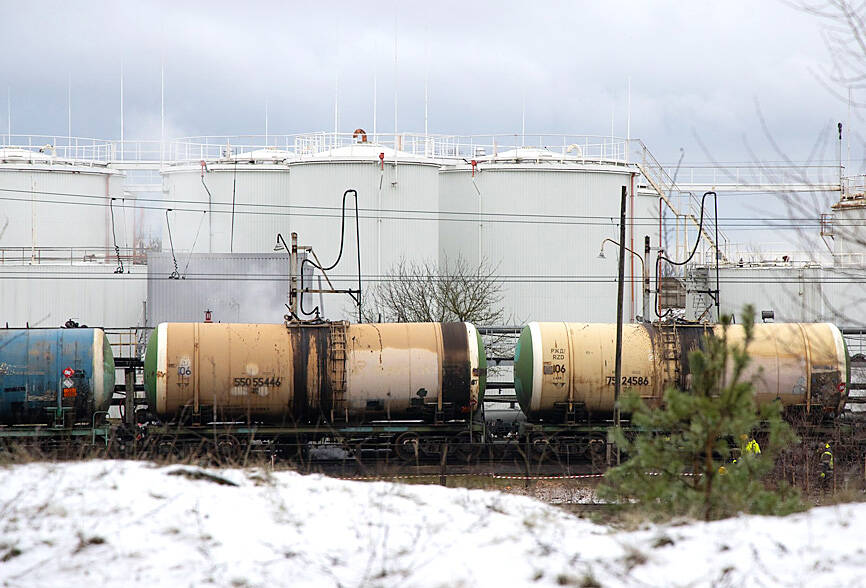Oil on Friday fell to the lowest levels since early last month as long-term headwinds overwhelmed the positive sentiment from a strong US jobs report.
Brent crude for March delivery dropped below US$80 a barrel, falling 2.71 percent to US$79.94, while West Texas Intermediate for February delivery fell 3.28 percent to US$73.39.
Brent dropped 7.75 percent from last week’s US$86.66, while West Texas Intermediate fell 7.89 percent from the previous week’s US$79.68.

Photo: Bloomberg
Futures for both grades climbed earlier in the session as record-low US unemployment figures spurred optimism that demand would hold up.
However, those gains evaporated as concerns about swelling US stockpiles and weaker-than-expected China demand dominated the trading narrative.
“The commodity fundamentals aren’t really improving or tightening up a lot,” TD Securities commodity trading strategy head Bart Melek said. “There’s a view out there that global supplies are certainly withstanding the Russian sanctions, and of course we continue to worry about headwinds from China.”
Meanwhile, G7 nations and the EU on Friday said they would impose a cap of US$100 per barrel on sales of Russian diesel to third countries as part of an effort to limit Moscow’s revenues.
The price cap mechanism is tied to an EU ban on seaborne imports of Russian refined fuels that starts today.
The G7 said that it and the EU agreed to a US$100 per barrel level for petroleum products that trade at a premium to crude oil, including diesel, and also backed a cap of US$45 for those that sell at a discount, such as fuel oil and some types of naphtha.
The coalition also agreed to delay a review of a US$60 price cap for Russian crude oil until next month.
It would then begin regular two-month reviews of all the cap levels, said people familiar with the discussions, who asked not to be identified.
Setting the prices requires unanimous agreement among the EU, as well as signoff from the G7.
Additional reporting by staff writer

SEMICONDUCTORS: The firm has already completed one fab, which is to begin mass producing 2-nanomater chips next year, while two others are under construction Taiwan Semiconductor Manufacturing Co (TSMC, 台積電), the world’s largest contract chipmaker, plans to begin construction of its fourth and fifth wafer fabs in Kaohsiung next year, targeting the development of high-end processes. The two facilities — P4 and P5 — are part of TSMC’s production expansion program, which aims to build five fabs in Kaohsiung. TSMC facility division vice president Arthur Chuang (莊子壽) on Thursday said that the five facilities are expected to create 8,000 jobs. To respond to the fast-changing global semiconductor industry and escalating international competition, TSMC said it has to keep growing by expanding its production footprints. The P4 and P5

DOWNFALL: The Singapore-based oil magnate Lim Oon Kuin was accused of hiding US$800 million in losses and leaving 20 banks with substantial liabilities Former tycoon Lim Oon Kuin (林恩強) has been declared bankrupt in Singapore, following the collapse of his oil trading empire. The name of the founder of Hin Leong Trading Pte Ltd (興隆貿易) and his children Lim Huey Ching (林慧清) and Lim Chee Meng (林志朋) were listed as having been issued a bankruptcy order on Dec. 19, the government gazette showed. The younger Lims were directors at the company. Leow Quek Shiong and Seah Roh Lin of BDO Advisory Pte Ltd are the trustees, according to the gazette. At its peak, Hin Leong traded a range of oil products, made lubricants and operated loading

The growing popularity of Chinese sport utility vehicles and pickup trucks has shaken up Mexico’s luxury car market, hitting sales of traditionally dominant brands such as Mercedes-Benz and BMW. Mexicans are increasingly switching from traditionally dominant sedans to Chinese vehicles due to a combination of comfort, technology and price, industry experts say. It is no small feat in a country home to factories of foreign brands such as Audi and BMW, and where until a few years ago imported Chinese cars were stigmatized, as in other parts of the world. The high-end segment of the market registered a sales drop

Citigroup Inc and Bank of America Corp said they are leaving a global climate-banking group, becoming the latest Wall Street lenders to exit the coalition in the past month. In a statement, Citigroup said while it remains committed to achieving net zero emissions, it is exiting the Net-Zero Banking Alliance (NZBA). Bank of America said separately on Tuesday that it is also leaving NZBA, adding that it would continue to work with clients on reducing greenhouse gas emissions. The banks’ departure from NZBA follows Goldman Sachs Group Inc and Wells Fargo & Co. The largest US financial institutions are under increasing pressure